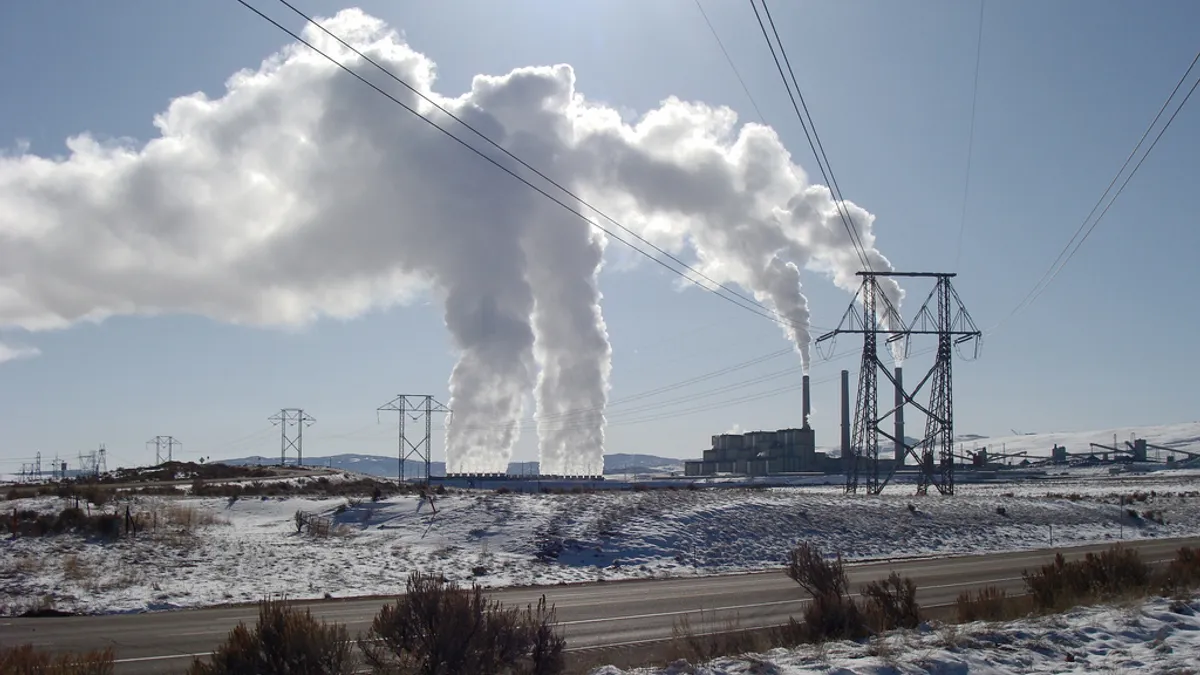Dive Brief:
- Tri-State Generation & Transmission said Thursday it will shutter its coal generation and mining operations in New Mexico and Colorado by 2030, and believes it can maintain stable rates by replacing the power with cheaper renewable assets.
- The G&T utility will close the Escalante Station coal plant near Prewitt, N.M., by end of 2020, and the Craig Station plant and associated Colowyo Mine in northwest Colorado by 2030.
- But it is not clear the announcement will quell a rebellion among some Tri-State's members who want lower rates and the ability to develop their own local renewable power. According to the Sierra Club, Tri-State charges its 43 co-ops in Wyoming, Colorado, New Mexico and Nebraska rates that are approximately 20% above average.
Dive Insight:
Details on how Tri-State will replace the shuttered coal capacity will have to wait for an announcement next week, said company officials, as right now the focus remains on local community impacts. Almost 600 jobs will be affected.
The 253 MW Escalante Station began operations in 1984, and the company said the closure will impact 107 employees. The 1,285 MW Craig Station began operating in 1979 and employs 253 people. Tri-State had already planned to shutter the 427 MW Unit 1 by the end of 2025, and the company said that date remains unchanged. The 410 MW Unit 2 and 448 MW Unit 3 will close by 2030.
The Craig Station utilizes coal from the Colowyo Mine, and Tri-State said it will cease production in 2030. The mine employees 219 people.
Employees will be offered retraining and can apply for jobs at other Tri-State facilities.
The company's focus is on its workers and "easing the transition whenever and wherever possible,” Tri-State CEO Duane Highley said. In a call with reporters, he said the closures were "an incredibly difficult decision."
But the plants are more expensive than new renewables, and their closure will be necessary to meet state environmental goals. While decarbonization efforts were hailed by advocates and Tri-State members, there is a concern that the decisions do not go far enough.
"While a step in the right direction, today’s announcement neglects key concerns from its member cooperatives," Sierra Club said in a statement. Those include the G&T utility's 5% cap on cooperative-generated electricity.
Tri-State's announcement comes just three days after dozens of business owners served by member cooperatives delivered a letter to the utility's board of directors, asking Tri-State to commit to 80% carbon-free electricity by 2030. While the closures will eliminate Tri-State's coal operations in Colorado and New Mexico, the utility will still utilize coal-fired generation from plants in other states.
Today, Tri-State has 1,684 MW of coal-fired generation, which will drop to 783 MW by 2030. The closures announced Thursday represent a 53% reduction of the utility's coal generation.
Tri-State owns portions of the Laramie River Station in Wyoming and Springerville plant in Arizona, alongside other utilities. "We cannot unilaterally decide to shut them down," a spokesman told Utility Dive in an email.
Some members have been looking to exit Tri-State's service, in an effort to develop more of their own generation. Cooperatives United Power and La Plata Electric Association (LPEA) have each executed requests for information seeking possible new replacement power. The two co-ops have also asked Colorado regulators to set a buy-out price to exit Tri-State's service.
Colorado’s Delta Montrose Electric Association and New Mexico’s Kit Carson Electric Cooperative have already left Tri-State service.
LPEA officials told Utility Dive they are still pursuing a buy-out number "to weigh all options."
LPEA CEO Jessica Matlock said in an email that the utility was given no details about the announcement.
"There was little to no collaboration with [Tri-State's] members on this plan and the plan for replacement power," Matlock said. "I hope that [Tri-State] modernizes its processes and creates a collaborative, respectful and a sincere interest in hearing from communities on how to solve this issue together."
United Power also was not consulted on the plan, according to Dean Hubbuck, United's director of power supply and rates.
"We have not received an official copy of the plan, it's just the descriptions everyone else has received," Hubbuck told Utility Dive. "At the end, we're still disappointed we weren't consulted in the development of this plan so we'd know more about it."
While Hubbuck said United is "cautiously optimistic" about Tri-State's announcement, he also said the cooperative is still seeking a buyout figure from Colorado regulators.
"This does not slow us down, in terms of us taking a look at our overall buyout and self-supply options," Hubbuck said.
Tri-State in July 2019 announced a plan aimed at reducing carbon emissions. In an email, a spokesman said the utility "will be announcing more details of our Responsible Energy Plan next week."















